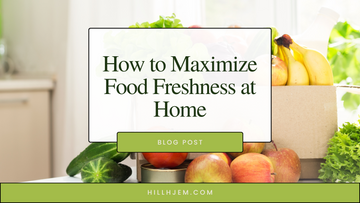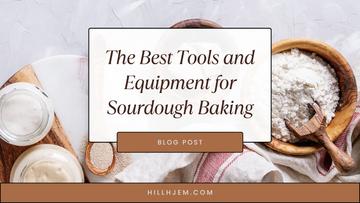
We've all been there: you buy a crisp head of lettuce, a bunch of vibrant herbs, or a basket of juicy berries, only to find them wilted, limp, or moldy a few days later.
Maintaining peak freshness for your food isn't just about convenience, it's about maximizing flavor, nutrition, and creating a foundation for a healthy lifestyle. Fresh food simply tastes better, and it packs a powerful punch of essential vitamins and minerals.
So, how can we maximize the freshness of our food right in our own kitchens? Let's delve into some practical tips and tricks.
1. Shop Smart
It all starts at the grocery store or farmers' market. Choose fruits and vegetables that are in season, as they are more likely to be fresh and flavorful. Look for vibrant colors, firm textures, and avoid any signs of bruising or wilting. Additionally, try to buy locally sourced produce whenever possible, as it often spends less time in transit, locking in its nutrients and freshness.
2. Storage Solutions
Proper storage is key to preserving the freshness of your food.
But before we dive into that, let’s identify the culprits behind food spoilage:
- Oxygen: This is enemy number one for many fruits and vegetables. Exposure to oxygen accelerates enzymatic browning (think: brown spots on apples) and spoilage.
- Moisture: Excess moisture can lead to mold growth and mushiness. Leafy greens and herbs are particularly susceptible.
- Ethylene Gas: Some fruits and vegetables, like apples, bananas, and avocados, emit ethylene gas, which hastens the ripening of other produce around them.
Now that we've identified these freshness-busters, invest in quality storage containers that are airtight and moisture-proof to keep perishables like fruits, vegetables, and leftovers fresh for longer. Opt for transparent containers for easy identification, preventing food from languishing in the back of the fridge, forgotten and destined for the waste bin.
3. Temperature Control
Maintaining the right temperature in your refrigerator and freezer is essential. Keep your refrigerator set at 35-38°F (1.7-3.3°C) and your freezer at 0°F (-18°C) to slow down bacterial growth and prevent food spoilage. Use a refrigerator thermometer to ensure accuracy, as even a few degrees off can significantly impact the shelf life of your groceries.
4. First In, First Out (FIFO)
Adopting a FIFO approach ensures older food items are used before newer ones, minimizing waste. Arrange your pantry and refrigerator shelves like a well-oiled machine, placing newly purchased items at the back and older ones at the front. This simple strategy prevents perfectly good food from expiring unnoticed, saving you money and reducing your environmental footprint.
5. Proper Handling
Treat your food with care to maintain its freshness. Wash your hands thoroughly before and after handling food to prevent contamination. When preparing fruits and vegetables, delay cutting them until you're ready to use them. Exposure to air accelerates spoilage, so a little planning goes a long way.
6. Mindful Cooking
Plan your meals thoughtfully to make the most of your fresh ingredients. Weave perishable items into your meals early in the week and save heartier produce for later. Embrace techniques like blanching, freezing, and vacuum sealing to extend the shelf life of your food without compromising on flavor. Leftovers become delicious opportunities with proper storage and creative reimagining.
7. Revive and Refresh
If you find yourself with slightly wilted greens or limp vegetables, don't despair. Revive them by soaking them in ice water for a few minutes to crisp them up. Similarly, slightly stale bread can be revived by sprinkling it with water and heating it in the oven for a few minutes.
8. Stay Organized
Keeping your kitchen organized empowers you to manage your food inventory effectively. Implement a labeling system or use a digital inventory app to track expiration dates and streamline meal planning. By knowing what you have on hand, you can avoid impulse purchases and ensure nothing gets lost in the fridge abyss.
Bonus Tips:
- Fresh herbs can be stored in a glass of water on the countertop, just like cut flowers. Change the water daily. This simple trick extends the life of your basil, cilantro, parsley, and mint, keeping them fresh and flavorful for longer.
- Blanching vegetables involves boiling them briefly and then submerging them in ice water. This inactivates enzymes that contribute to spoilage and makes them store better frozen. Blanched vegetables retain more nutrients and vibrant colors compared to unblanched options, making them a great choice for freezing summer produce to enjoy throughout the year.
- For long-term storage of certain dry goods like nuts or grains, consider investing in mylar bags with oxygen absorbers. These create an oxygen-depleted environment that slows spoilage significantly. This method is ideal for bulk purchases or items you don't use frequently, like flour, rice, or nuts.
- Keep ethylene gas emitters like apples, bananas, and avocados away from ethylene-sensitive produce like lettuce, leafy greens, and herbs. This will help prevent the sensitive items from ripening too quickly and spoiling prematurely. You can designate separate drawers in your fridge or use produce bags to create barriers.
- Don't toss those citrus peels just yet! Place them in a bowl with brown sugar and leave it on your counter to create a natural air freshener. The sugar absorbs moisture and the peels release a pleasant citrus aroma, keeping your kitchen smelling invigorating.
- Looking to preserve food for an extended period? Canning is a great option for fruits and vegetables. Be sure to research proper canning techniques to ensure food safety.
By implementing these strategies into your daily routine, you'll create a well-rounded approach to maximizing food freshness at home, leading to tastier meals, reduced food waste, and a healthier lifestyle overall. Remember, freshness isn't just about what you eat—it's about how you care for and appreciate the food that nourishes you.




